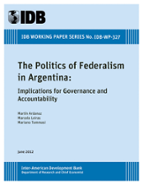The Politics of Federalism in Argentina: Implications for Governance and Accountability
Date
Jun 2012
This paper contributes to an agenda that views the effects of policies and institutional reforms as dependent on the structure of political incentives for national and subnational political actors. The paper studies political incentive structures at the subnational level and the mechanisms whereby they affect national-level politics and policymaking at the national level in Argentina, a highly decentralized middle-income democracy, Argentina. The Argentine political system makes subnational political power structures very influential in national politics. Moreover, most Argentine provinces are local bastions of power dominated by entrenched elites, characterized by scarce political competition, weak division of powers, and clientelistic political linkages. Political dominance in the provinces and political importance at the national level reinforce each other, dragging the Argentine political and policymaking system towards the practices and features of its most politically backward regions.



